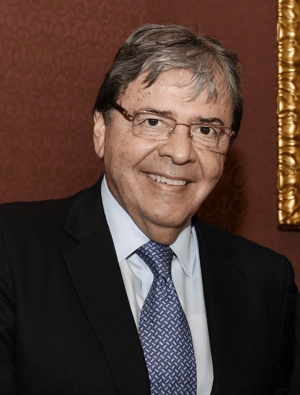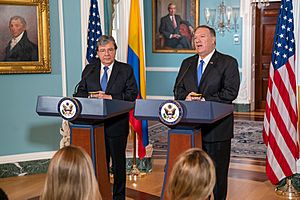Carlos Holmes Trujillo facts for kids
Quick facts for kids
Carlos Holmes Trujillo
|
|
|---|---|
 |
|
| Minister of Defense | |
| In office 12 November 2019 – 26 January 2021 |
|
| President | Iván Duque |
| Preceded by | Guillermo Botero |
| Succeeded by | Diego Molano |
| Minister of Foreign Affairs | |
| In office 7 August 2018 – 12 November 2019 |
|
| President | Iván Duque |
| Preceded by | María Ángela Holguín |
| Succeeded by | Claudia Blum |
| Minister of Interior | |
| In office 7 August 1997 – 28 January 1998 |
|
| President | Ernesto Samper |
| Preceded by | Horacio Serpa |
| Succeeded by | Alfonso López Caballero |
| Minister of Education | |
| In office 5 February 1992 – 7 August 1993 |
|
| President | César Gaviria |
| Preceded by | Alfonso Valdivieso |
| Succeeded by | Maruja Pachón |
| Mayor of Cali | |
| In office 1 January 1988 – 1 January 1990 |
|
| Preceded by | Henry Eder Caicedo |
| Succeeded by | Germán Villegas |
| Personal details | |
| Born |
Carlos Holmes Trujillo García
23 September 1951 Cartago, Cauca Valley, Colombia |
| Died | 26 January 2021 (aged 69) Bogotá, D.C., Colombia |
| Political party | Democratic Center |
| Alma mater | University of Cauca Sophia University |
Carlos Holmes Trujillo García (born September 23, 1951 – died January 26, 2021) was an important Colombian politician. He was also a diplomat, a scholar, and a lawyer. He held many high-ranking jobs in the government. These included being the Minister of Defense, Foreign Affairs, Interior, and Education. He also served as the mayor of Cali. Plus, he was an ambassador to several international groups and countries.
Contents
Early Life and School
Family Background
Carlos Holmes Trujillo was born in Cartago, Valle del Cauca, Colombia. His father, Carlos Holmes Trujillo Sr., was a powerful politician and diplomat. His mother was Genoveva García. Carlos Holmes Trujillo also had a younger brother, José Renán Trujillo, who was involved in politics too.
Education and Studies
Carlos went to Liceo Cartago for primary school. He then attended Pio XII high school in Cali. Like his father, he studied law at the University of Cauca. He focused on criminal law. When he was 25, he became a consul in Tokyo, Japan. There, he continued his studies. He earned a master's degree in International Business.
Start of Political Career
Coming Back to Colombia
After finishing his studies in Tokyo, Trujillo returned to Colombia in 1983. He was appointed Cali's Finance Secretary. This job was given to him by Mayor Julio Riascos. A year later, Trujillo became the director of Colombia's metal federation. At the same time, he grew in power within his father's Liberal Party. He became the party's vice-president.
Serving as Mayor of Cali
In 1988, Trujillo became the first elected mayor of Cali. He stayed in this role until 1990. During his time as mayor, he helped create the Colombian Federation of Municipalities (FCM). He also became its chairman. This helped him expand his influence across the country.
National Government Roles
Minister Under a New Constitution
As chairman of the FCM and vice-president of the Liberal Party, Trujillo helped create Colombia's 1991 constitution. This new constitution was part of a peace process. It aimed to bring peace with the 19th of April Movement (M-19). This was a former guerrilla group.
After elections that year, President César Gaviria appointed Trujillo as Minister of Education. He held this position from 1992 until 1994.
Ambassador to the OAS
Later, President Ernesto Samper appointed Trujillo as ambassador to the Organization of American States (OAS). This happened during a time when the president's campaign was being investigated. In 1997, Trujillo was called back to Colombia. He became the Minister of Interior. He held this job until the end of Samper's presidency.
Diplomatic Work Abroad
President Andrés Pastrana Arango took office in 1998. He appointed Trujillo as ambassador to Austria. From 1999 to 2001, Trujillo served as ambassador to Russia.
After a short break, Trujillo became ambassador for Scandinavia in 2004. This appointment was made by President Álvaro Uribe Vélez. A year later, Iceland was also added to his diplomatic duties.
In 2006, Uribe appointed Trujillo as ambassador to the European Union. He held this important role until 2011.
Joining the Democratic Center Party

Trujillo remained close to former President Uribe. In 2013, he joined other politicians to form the "Uribista" Democratic Center (CD) party. This party was formed by supporters of Álvaro Uribe.
Entering Congress
In the 2014 elections, Trujillo ran as the running-mate for Óscar Iván Zuluaga. They were against the current president, Juan Manuel Santos. They did not win the election. However, the Democratic Center party became the fourth largest in Congress. It became the main opposition party to President Santos.
The party strongly disagreed with the peace talks Santos was having with the FARC. Despite this opposition, Santos signed a peace agreement in November 2016.
Serving Under President Duque
Trujillo tried to become the "Uribista" candidate for president in 2018. But he lost to Senator Iván Duque. Duque's political career had started just four years earlier.
Duque won the 2018 elections. He then appointed Carlos Holmes Trujillo as his Minister of Foreign Affairs.
Death
In January 2021, Trujillo became sick with COVID-19. He was taken to a hospital in Barranquilla. Later, he was moved to the Central Military Hospital in Bogotá. He passed away on January 26, 2021. He was 69 years old.
Colombian President Ivan Duque announced his death. The president declared three days of national mourning. This was to honor Trujillo and others who died from coronavirus.
See also
 In Spanish: Carlos Holmes Trujillo para niños
In Spanish: Carlos Holmes Trujillo para niños
 | Shirley Ann Jackson |
 | Garett Morgan |
 | J. Ernest Wilkins Jr. |
 | Elijah McCoy |

